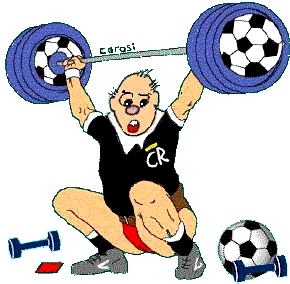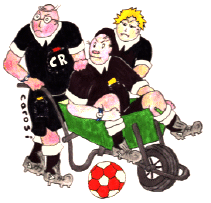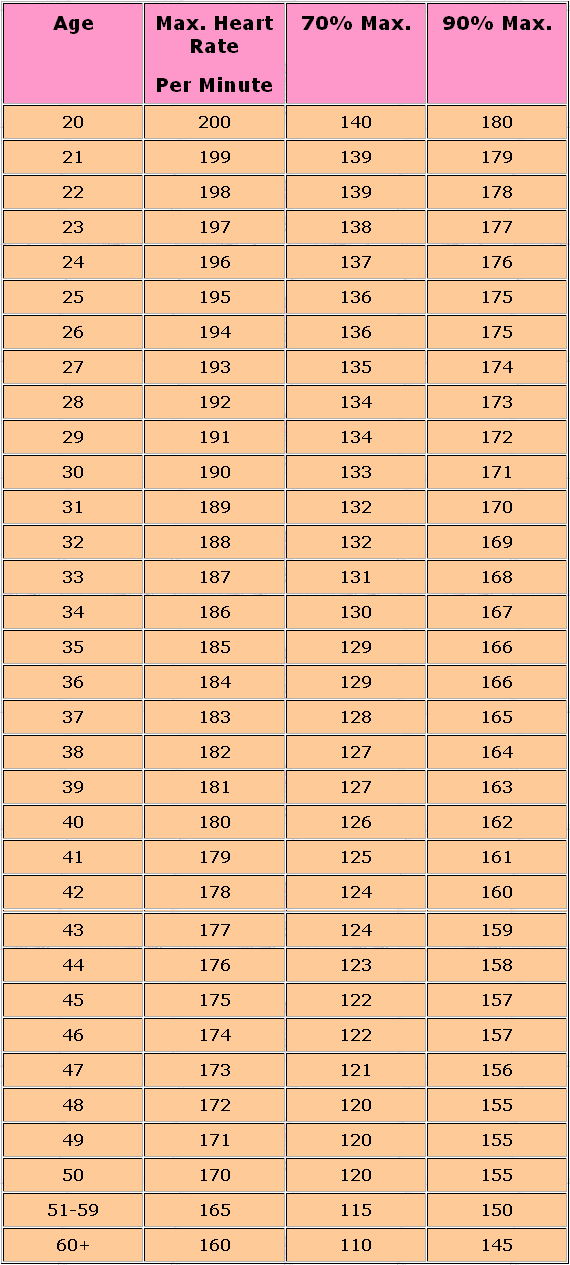| |
 |
IMPROVING & MAINTAINING FITNESS
Preparing and Training…
Andrew Castiglione
Founder of Ken Aston Referee Society
 |
IMPROVING AND MAINTAINING
FITNESS
STARTING TO GET FIT...
HEART
 RATE AS A GUIDE TO WORKRATE (Chart)
RATE AS A GUIDE TO WORKRATE (Chart)
STANDARD FITNESS PROGRAMME
INTERMEDIATE FITNESS PROGRAMME
ADVANCED FITNESS PROGRAMM |
 |
IMPROVING AND MAINTAINING
FITNESS
Refereeing is basically an endurance activity, which means you must have
the stamina (aerobic fitness) to be able to do the necessary running for
90 or perhaps 120 minutes. You also need to be quick in your movements
and reactions so you can adjust according to the location of the players
and the ball, and take decisions rapidly and decisively. External
conditions such as the weather or poor state of the pitch can increase
the demands made upon you.
Stamina can be improved in many ways, but the best activity to perform
is continuous steady running. You can use a bike, a rowing machine or
the swimming pool as an alternative to improve your fitness, and to add
variety, but the majority of your training should be based upon running.
STARTING TO GET FIT...
Use your Fitness Awareness Profile as a guide to how
much training you should do to start with. If a few of your activities
were in the 'C'
category including... Activities 11 and 12, you should take care not to
do too much too soon.
- When you first go out
for a run use time rather than distance as a target.
i.e. Run for 10 minutes rather than run round the block.
Run away from your starting point for 5 minutes - turn - and run
back again. This means, if you are
exhausted after 9 minutes you are nearly back home instead of 9 minutes
away!
Gradually increase the time for your outward run until you can
achieve 10 minutes in that direction. When starting to exercise follow
these guidelines:
 - Build up slowly until you can run continuously for 20 minutes.
- Build up slowly until you can run continuously for 20 minutes.
 - Run at a speed that increases your heart rate to between 70-90% of
maximum. (See chart below).
- Run at a speed that increases your heart rate to between 70-90% of
maximum. (See chart below).
 - Check heart rate by taking the pulse rate for 15 seconds and then
multiplying by 4. Adjust speed of running accordingly.
- Check heart rate by taking the pulse rate for 15 seconds and then
multiplying by 4. Adjust speed of running accordingly.
 - Alternatively, perform the conversation test - you should be able to
hold a short conversation with your training partner without becoming
totally out of breath. If this is not possible, the exercise intensity
should be decreased, even if this means walking for a while. Conversely,
if conversation is too easy, the exercise intensity should be increased.
- Alternatively, perform the conversation test - you should be able to
hold a short conversation with your training partner without becoming
totally out of breath. If this is not possible, the exercise intensity
should be decreased, even if this means walking for a while. Conversely,
if conversation is too easy, the exercise intensity should be increased.
Aim for three sessions a week until
you are ready to Referee.
Remember - Even if you are just going for a short run
the body still needs to be prepared. Complete the stretching exercises
before you start running. Use the first few minutes of your run as a
warm up by jogging slowly before increasing your pace. At the end of
your run repeat the stretching exercises. This is particularly important
if you have not trained for some time as it will help to prevent muscle
stiffness.
When you can run continuously for...
20 minutes you can
now proceed to the next stage.
HEART
 RATE AS A GUIDE TO WORK RATE (Chart)
RATE AS A GUIDE TO WORK RATE (Chart)

STANDARD FITNESS PROGRAMME
This program is aimed at those of you who wish to maintain a level of
fitness suitable for officiating in local football.
Training Sessions
A
5-10 minutes jogging to warm up
S t r e t c h i n g
30 minutes steady paced run at conversational pace
5-10 minutes jogging to warm down
S t r e t c h i n g
B
5-10 minutes jogging to warm up
S t r e t c h i n g
10 minutes fast paced running (you should be running at a pace where you
cannot maintain a conversation and you should feel "puffed" at the end
of this run)
5-10 minutes jogging to warm down
S t r e t c h i n g
When you can comfortably run for 20-30 minutes you can begin to include
some referee specific training together with some interval training,
which is ideal for you as it mimics the demands of refereeing. Interval
training stimulates the heart, lungs and muscles and builds up your
endurance and recovery level of your body.
Examples of some interval training sessions are included below.
C
5-10 minutes jogging to warm up
S t r e t c h i n g
Interval Training
 - Walk 50 meters (width of a football pitch)
- Walk 50 meters (width of a football pitch)
 - Jog 70 meters, sprint 10 meters, jog 20 meters (length of a football
pitch)
- Jog 70 meters, sprint 10 meters, jog 20 meters (length of a football
pitch)
 - Walk the width of the pitch
- Walk the width of the pitch
 - Jog 70 meters, sprint 10 meters, jog 20 meters
- Jog 70 meters, sprint 10 meters, jog 20 meters
 - Repeat 10 x laps
- Repeat 10 x laps
5-10 minutes jogging to warm down
S t r e t c h i n g
D
This session involves running 4 miles in total
5 minutes general body warm up
S t r e t c h i n g
Run the first half mile as a steady jog as a further warm up
The next 3 miles should be run slightly quicker and should include 10
bursts of mixed distances - 30 meters, 200 meters, 50 meters, 30 meters,
150 meters etc. - sprinting the shorter distances and fast running the
longer distances
The last half mile acts as a slow jog warm down
S t r e t c h i n g
This session can be performed around a football pitch or park, over
countryside or along the street using lamp posts as distance guides for
the sprints and faster runs.
E
This session needs to be performed around a 50-meter square (i.e. half a
football pitch).
Jog 3 laps to warm up
S t r e t c h i n g
Jog one 50 meter length - rest for 6 seconds
Run backwards for 20 meters, turn and sprint 10 meters, slow down to a
walk during the next 20 meters
Jog 50 meters - rest for 6 seconds
Run backwards for 20 meters, turn and sprint 10 meters, slow down to a
walk during the next 20 meters
Repeat for 10 laps
Jog 3 laps to warm down
S t r e t c h i n g
- Aim for 3 sessions a
week - refereeing a match would count as one session, but always try and
include at least one training session even if you are refereeing more
than one game during the week.
- Vary your type of
training by choosing a "running" based session on one occasion and an
"interval" type session on another.
INTERMEDIATE FITNESS PROGRAMME
This program is aimed at all officials wishing to gain promotion and/or
referee up to and including Supply League level.
Training Sessions
A
5-10 minutes jogging to warm up
S t r e t c h i n g
20 minutes fast paced running (you should be running at a pace where you
cannot maintain a conversation and you should feel fatigued at the end
of this run)
5-10 minutes to warm down
S t r e t c h i n g
B
5-10 minutes jogging to warm up
S t r e t c h i n g
30 minutes steady run at conversational pace, to include 10 bursts of
short fast sprints over distances from 10 to 50 meters, and 5 bursts of
fast running over distances from 150-250 meters
5-10 minutes jogging to warm down
S t r e t c h i n g
C
5-10 minutes jogging to warm up
S t r e t c h i n g
3 minutes hard running - but at a pace you can maintain for 3 minutes
3 minutes slow jogging
Repeat hard running and slow jogging 3 times but on the last time slow
jog for 5-10 minutes to warm down
S t r e t c h i n g
D
5-10 minutes jogging to warm up
S t r e t c h i n g
60 seconds burst (80% max. speed) followed by 60 seconds jogging
30 seconds burst (90% max. speed) followed by 90 seconds jogging
10 seconds burst at full sprinting speed. Followed by 50 seconds jogging
Repeat this sequence twice
10 minutes jogging
S t r e t c h i n g
E
5-10 minutes jogging to warm up
S t r e t c h i n g
Interval Training - Run these distances as fast as you can
 - 50 meters (20 seconds rest)
- 50 meters (20 seconds rest)
 - 100 meters (30 seconds rest)
- 100 meters (30 seconds rest)
 - 150 meters (40 seconds rest)
- 150 meters (40 seconds rest)
 - 200 meters (60 seconds rest)
- 200 meters (60 seconds rest)
 - 150 meters (40 seconds rest)
- 150 meters (40 seconds rest)
 - 100 meters (30 seconds rest)
- 100 meters (30 seconds rest)
 - 50 meters (20 seconds rest)
- 50 meters (20 seconds rest)
 - 5 minutes slow jogging
- 5 minutes slow jogging
Repeat sequence
S t r e t c h i n g
F
5-10 minutes jogging to warm up
S t r e t c h i n g
Sprinting
 - 10 meters sprint, slow down to walk 10 meters,
- 10 meters sprint, slow down to walk 10 meters,
 - 20 meters sprint, walk slowly back to your starting point
- 20 meters sprint, walk slowly back to your starting point
 - Repeat x 10
- Repeat x 10
5-10 minutes jogging to warm down
S t r e t c h i n g
G
Use session E from the standard fitness program but repeat for 15 laps.
- Aim for 3 sessions a
week - refereeing a match would count as one session, but always try and
include at least one training session even if you are refereeing more
than one game during the week.
- Vary your type of
training by choosing a "running" based session on one occasion and an
"interval / sprint" type session on another.
ADVANCED FITNESS PROGRAMME
This program is aimed at all referees officiating in senior football,
from Contributory League level upwards.
Training Sessions
A
5-10 minutes jogging to warm up
S t r e t c h i n g
30 minutes fast paced running (you should be running at a pace where you
cannot maintain a conversation and you should feel fatigued at the end
of this run)
5-10 minutes to warm down
S t r e t c h i n g
B
5-10 minutes jogging to warm up
S t r e t c h i n g
30-40 minutes steady run at conversational pace, to include 12 bursts of
short fast sprints over distances from 10 to 50 meters, and 6 bursts of
fast running over distances from 150-250 meters
5-10 minutes jogging to warm down
S t r e t c h i n g
C
5-10 minutes jogging to warm up
S t r e t c h i n g
4 x 60 seconds running at a fairly fast pace with 200 meters jogging
between each effort
3 minutes jogging
Repeat 4 x 60 seconds running
10 minutes jogging to warm down
S t r e t c h i n g
The 60 seconds of
running can include turns and changes in direction
D
5-10 minutes jogging to warm up
S t r e t c h i n g
4 x 5 minutes fairly hard running with 3 minutes jogging between each
run
10 minutes jogging to warm down
S t r e t c h i n g
The 5 minutes of
running can include turns and changes in direction
E
5-10 minutes jogging to warm up
S t r e t c h i n g
Sprint Training -
 - Sprints at 70% - 80% of maximum pace
- Sprints at 70% - 80% of maximum pace
 - 10 seconds running
- 10 seconds running
 - 15 seconds rest / recovery
- 15 seconds rest / recovery
 - Repeat x 6
- Repeat x 6
 - Rest for 2 minutes
- Rest for 2 minutes
 - Repeat procedure x 6(36 sprints in total)
- Repeat procedure x 6(36 sprints in total)
10 minutes jogging to warm down
S t r e t c h i n g
F
5-10 minutes jogging to warm up
S t r e t c h i n g
Sprints - Maximum Pace -
 - Sprint 10 meters - walk back to start
- Sprint 10 meters - walk back to start
 - Sprint 20 meters - walk back to start
- Sprint 20 meters - walk back to start
 - Sprint 30 meters - walk back to start
- Sprint 30 meters - walk back to start
 - Sprint 40 meters - walk back to start
- Sprint 40 meters - walk back to start
 - Sprint 30 meters - walk back to start
- Sprint 30 meters - walk back to start
 - Sprint 20 meters - walk back to start
- Sprint 20 meters - walk back to start
 - Sprint 10 meters - walk back to start
- Sprint 10 meters - walk back to start
 - REPEAT WHOLE SEQUENCE
- REPEAT WHOLE SEQUENCE
10 minutes jogging to warm down
S t r e t c h i n g
- Aim for 3 sessions a
week - refereeing a match would count as one session, but always try and
include at least one training session even if you are refereeing more
than one game during the week.
- Vary your type of
training by choosing a "running" based session on one occasion and an
"interval / sprint" type session on another.
Source of information: 'A Guide to Fitness for Referees' April 2001,
produced by the Football Association England. Acknowledgement to the
National Coordinator for Fitness Training, Vernon Crew; along with
expert advice from John Brewer, Director of the Lilleshall Sports Injury
and Human Performance Center; Alan Hodson, Director of the Football
Association Medical Education Center; and Rob Hartley, Head of the
Sports Science Department, University of Brighton.
|